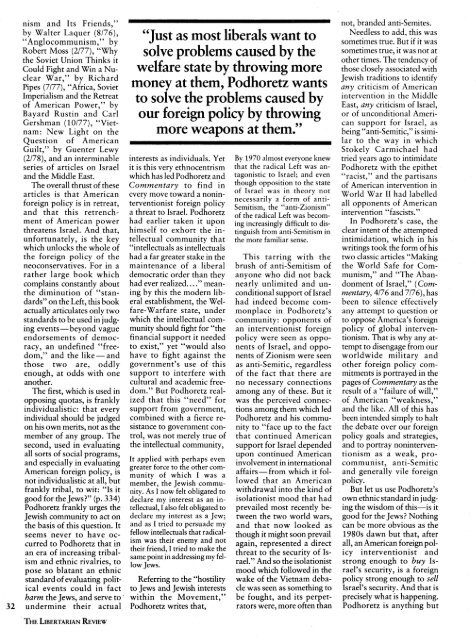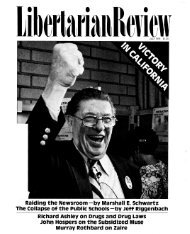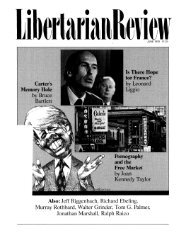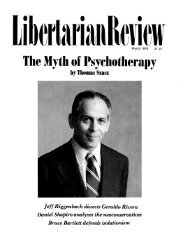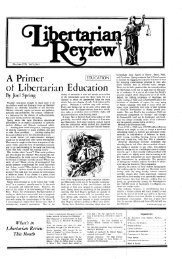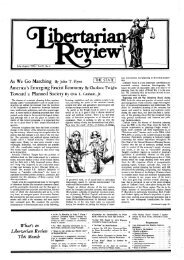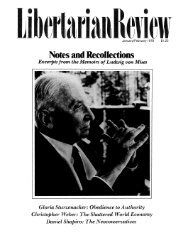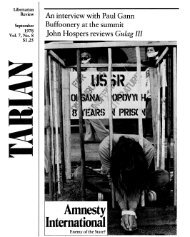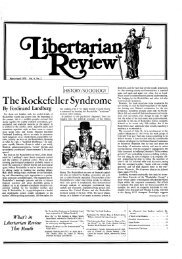The Libertarian Review March 1980 - Libertarianism.org
The Libertarian Review March 1980 - Libertarianism.org
The Libertarian Review March 1980 - Libertarianism.org
You also want an ePaper? Increase the reach of your titles
YUMPU automatically turns print PDFs into web optimized ePapers that Google loves.
32nism and Its Friends,"by Walter Laquer (8/76),"Anglocommunism," byRobert Moss (2/77), "Whythe Soviet Union Thinks itCould Fight and Win a NuclearWar," by RichardPipes (7/77), "Africa, SovietImperialism and the Retreatof American Power," byBayard Rustin and CarlGershman (10/77), "Vietnam:New Light on theQuestion of AmericanGuilt," by Guenter Lewy(2/78), and an interminableseries of articles on Israeland the Middle East.<strong>The</strong> overall thrust ofthesearticles is that Americanforeign policy is in retreat,and that this retrenchmentof American powerthreatens Israel. And that,unfortunately, is the keywhich unlocks the whole ofthe foreign policy of theneoconservatives. For in arather large book whichcomplains constantly aboutthe diminution of "standards"on the Left, this bookactually articulates only twostandards to be used in judgingevents-beyond vagueendorsements of democracy,an undefined "freedom,"and the like - andthose two are, oddlyeriough, at odds with oneanother.<strong>The</strong> first, which is used inopposing quotas, is franklyindividualistic: that everyindividual should be judgedon his own merits, not as themember of any group. <strong>The</strong>second, used in evaluatingall sorts of social programs,and especially in evaluatingAmerican foreign policy, isnot individualistic at all, butfrankly tribal, to wit: "Is itgood for the Jews?" (p. 334)Podhoretz frankly urges theJewish community to act onthe basis of this question. Itseems never to have occurredto Podhoretz that inan era of increasing tribalismand ethnic rivalries, topose so blatant an ethnicstandard ofevaluating politicalevents could in factharm the Jews, and serve to /undermine their actual, THE LIBERTARIAN REVIEW"Just as tnost liberals want tosolve problems caused by thewelfare state by throwing tnoretnoney at.thetn, Podhoretz wantsto solve the probletns caused byour foreign policy by throwingtnore weapons at thetn."interests as individuals. Yetit is this very ethnocentrismwhich has led Podhoretz andCommentary to find inevery move toward a noninterventionistforeign policya threat to Israel. Podhoretzhad earlier taken it uponhimself to exhort the intellectualcommunity that"intellectuals as intellectualshad a far greater stake in themaintenance of a liberaldemocratic order than theyhad ever realized...." meaningby this the modern liberaIestablishment, the Welfare-Warfaresta'te, underwhich the intellectual communityshould fight for "thefinancial support it neededto exist," yet "would alsohave to fight against thegovernment's use of thissupport to interfere withcultural and academic freedom."But Podhoretz realizedthat this "need" forsupport from government,combined with a fierce resistanceto government control,was not merely true ofthe intellectual community,It applied with perhaps evengreater force to the other communityof which I was amember, the Jewish community.AsI now felt obligated todeclare my interest as an intellectual,I also felt obligated todeclare my interest as a Jew;and as I tried to persuade myfellow intellectuals that radicalismwas their enemy and· nottheir friend, I tried to make thesame pointin addressing my fellowJews.Referring to the "hostilitytoJews and Jewish interestswithin the Movement,"Podhoretz writes that,By 1970 almost everyone knewthat the radical Left was antagonisticto Israel; and eventhough opposition to the stateof Israel was in theory notnecessarily a form of antiSemitism, the "anti-Zionism"of the radical Left was becomingincreasingly difficult to distinguishfrom anti-Semitism inthe more familiar sense.This tarring with thebrush of anti-Semitism ofanyone who did not backnearly unlimited and unconditionalsupport ofIsraelhad indeed become commonplacein Podhoretz'scommunity: opponents ofan interventionist foreignpolicy were seen as opponentsof Israel, and opponentsof Zionism were seenas anti-Semitic, regardlessof the fact that there areno necessary connectionsamong any of these. But itwas the perceived connectionsamong them which ledPodhoretz and his communityto "face up to the factthat continued Americansupport for Israel dependedupon continued Americaninvolvement in internationalaffairs-from which it followedthat an Americanwithdrawal into the kind ofisolationist mood that hadprevailed most recently betweenthe two world wars,and that now looked asthough it might soon prevailagain, represented a directthreat to the security of Israel."And so the isolationistmood which followed in thewake of the Vietnam debaclewas seen as something tobe fought, and its perpetratorswere, more often thannot, branded anti-Semites.Needless to add, this wassometimes true. But if it wassometimes true, it was not atother times. <strong>The</strong> tendency ofthose closely associated withJewish traditions to identifyany criticism of Americanintervention in the MiddleEast, any criticism of Israel,or of unconditional Americansupport for Israel, asbeing "anti-Semitic," is similarto the way in whichStokely Carmichael hadtried years ago to intimidatePodhoretz with the epithet"racist," and the partisansof American intervention inWorld War II had labelledall opponents of Americanintervention "fascists."In Podhoretz's case, theclear intent of the attemptedintimidation, which in hiswritings took the form ofhistwo classic articles "Makingthe World Safe for Communism,"and "<strong>The</strong> Abandonmentof Israel," (Commentary,4/76 and 7/76), hasbeen to silence effectivelyany attempt to question orto oppose America's foreignpolicy of global interventionism.That is why any attemptto disengage from ourworldwide military andother foreign policy commitmentsis portrayed in thepages of Commentary as theresult of a "failure of will,"of American· "weakness,"and the like. All of this hasbeen intended simply to haltthe debate over our foreignpolicy goals and strategies,and to portray noninterventionismas a weak, procommunist,anti-Semiticand generally vile'foreignpolicy.But let us use Podhoretz'sown ethnic standardin judgingthe wisdom ofthis-is itgood for the Jews? Nothingcan be more obvious as the<strong>1980</strong>s dawn' but that, afterall, an American foreign policyinterventionist andstrong enough to buy Israel'ssecurity, is a foreignpolicy strong enough to sellIsrael's security. And that isprecisely what is happening.Podhoretz is anything but


